1 Beyond the Ice and Impact of Community Hockey Within Our Communities
Lynn LeVatte
The sport of ice hockey has been conceptualized as a cultural necessity and a way of being for Canadians. Hockey Canada is the National governing body for grassroots ice hockey within the 13 provinces and territories. During the past 3 years, our team at Cape Breton University has been fortunate to work with two wonderful partners: the Atlantic Hockey Group, from Moncton, New Brunswick, and Hockey Nova Scotia. This research aimed to examine coaching leadership skills to determine training experiences within Social Emotional Learning and to determine any existing gaps within training or barriers that impeded effective coaching practice. The research explored creative communication through various leadership activities and examples provided by project participants. We have collaborated with our partners and gained valuable knowledge. Sharing key highlights have been supported with evidence-based practices which can engage players, communities and coaches to realize the importance of and the positive impact in which ice hockey can contribute within our lives.
Many lessons from this research work focused upon inclusive sport practice, communication, language barriers, and supporting players from diverse backgrounds.
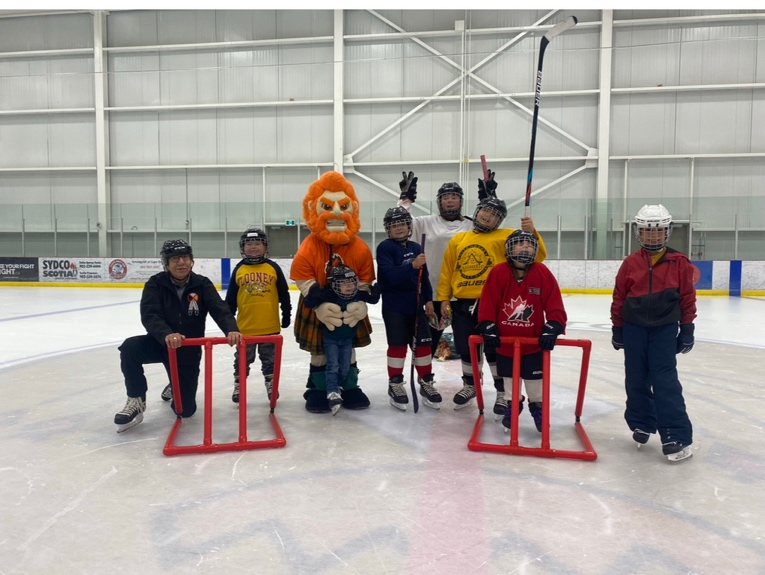
As an example, being involved with team sports can have many benefits for improved health among youth. Rates of depression in adolescents have been steadily rising, with self‐reported persistent feelings of sadness or hopelessness increasing in the United States over the past decade from 26.1% in 2009 to 36.7% in 2019 (LaRocca et al.,2023). In a recent study, researchers investigated depression and the impact of team sports and youth identifying within the LGBTQ+ communities. The results indicated that team sports participation was associated with reduced likelihood of depression in all groups and reduced likelihood of suicidal ideation in all groups except for LGBQ youth. These findings indicate that LGBTQ youth may experience similar mental health benefits of team sports participation as heterosexual and cisgender youth, supporting the importance of inclusive sports policy and programming (LaRocca et al., 2023).
The target audience of our work were minor hockey coaches from the Atlantic provinces who coached children and youth from ages 5+-18 years.
This research continued with designed knowledge mobilization that was impactful for coaches. One activity that researchers felt would be beneficial for coaches, who were primarily volunteers and had limited free time, was to create a podcast series. This podcast, “Beyond the Ice” focused upon key points extracted from the data and developed themes in which hockey personalities were invited to share their hockey coaching experiences, playing experiences and general thoughts from hockey experiences within the community.
The intersection of education, sport, and experiential learning involving researchers from Cape Breton University’s Education Department, Department of Sport Studies, and University of Toronto (Ontario Institute for Studies in Education) was used to collaborate and deliver a unique community need as requested by partners within the project. This project was funded through the Social Science & Humanities Research Council Partnership Engage Grant.
Generally, the researchers attempted to discover the following:
- How does the lived experiences of minor hockey coaches from Nova Scotia inform the understanding of leadership skill development, specific for the training needs to support minor hockey.
- How can this knowledge be utilized to enhance coaching education and leadership collaboration within minor hockey organizations?
The Podcast Creation: Beyond The Ice
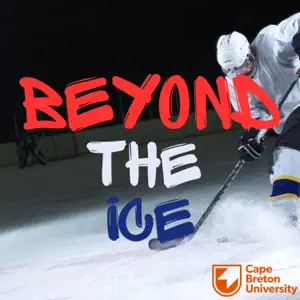
With the guidance of Sarah MacRae, a senior communications lab instructor at CBU, we ventured into the field of podcasting. We analyzed critical data sets and determined key themes that would potentially be of interest to the Atlantic Hockey Group coaches and administration.
The aim was to target those individuals who could exemplify key strategies and discussions that supported the positive impact of hockey leadership within our communities.
Podcast Guests
Sylvain Courturier and Isabelle Morrier
The partnership duo of Sylvain Couturier and Isabelle Morrier graciously agreed to participate and share key messages about coaching, the role of parents within hockey, communication and the integral strength of our hockey community both on and off the ice. Sylvain explained that as a coach or as a general manager strong leadership and expectations are critical:
“I have many roles to consider when selecting appropriate players for teams.
“Yes. I think even before a draft player, we do our own work on each player. And one thing we love, leadership is very important. But I think most important for us is having a good person in place and the good people. I mean, if you’re surrounded by good people, I think that the leadership will take over at some point. But we’re looking for players that are going to compete, obviously. But that’s going to take charge. You know, not shy away from said what they have to say. That’s part of the leader, especially when you’re a group, the hockey team is 23 players (LeVatte, et al. 2024).
As he explained, “so you need to be willing to step up and take responsibility. And that’s what we’re looking for in each and usual that we draft, or we trade for. I’m talking trades right now.” He reiterated the importance of responsibility and leadership of key players who are required for winning teams. He further expressed how leadership is a focal point within recruiting players to the team and how teammates must bring those skillsets to a team (LeVatte, et al., 2024)
“and that’s one thing we’re looking again, what kind of a person he is, is he going to fit with the group, and what kind of leadership that he’s going to bring. And that’s very important for us.”

|
Quebec Maritime Junior Hockey League Humanitarians of the Year Cam Squires – Cape Breton Eagles and Marcus Kearsey, Charlottetown Islanders
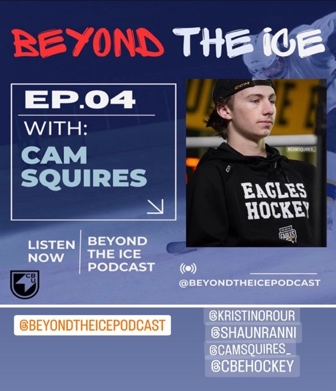
Cam considers Cape Breton to be a second home, and he credits the community for welcoming him with open arms. It is because of this that Cam feels passionate about doing his part and helping in the community, especially if it means he can be a role model for many young hockey players. In 2023, Cam was named the QMJ Humanitarian of the Year. Not only did he scale impressive numbers on the ice, but he also made a significant impact in the community. Cam selected the Boys and Girls Club of Cape Breton as his charity of choice and thus created the Squires Squad (LeVatte et al., 2024).
Within his program, he donated season tickets to the youth Non-profit Charity, which allowed families to attend the Eagles Home Games. Cam has also volunteered his time at the club to provide a mentorship service and he also engaged the children to reflect upon their lives and personal goals and even organized a ball hockey tournament that engaged the community.
Exploring life lessons which were exemplars from his hockey career created an authentic dialogue and demonstrated a true sense of gratitude. Cam explained that he gained so much from being an elite level hockey player and a draft choice of the NHL team New Jersey Devils. He described these experiences and work ethic which were so critical to his career:
“Yeah, so basically those lessons start to come when you’re eight or nine years old, just stepping on the ice for the first time. You learn to work within a team. I think that was the biggest thing that I learned from a young age, to work with others…because whether you grow up and you get older, you’re in a workplace or you’re in school, you’re going to have different personalities everywhere you go. So being able to bond and gel with different people, figure out what works, what doesn’t, I think was huge for me. Just continuing to grow up with my friends and figure that stuff out (LeVatte et al., 2024).
Pondering his personal journey through hockey, Cam noted the importance of focusing upon individual goal setting and how this can be generalized not only to hockey, but anything you which to achieve. When you create a plan, you can succeed:
“you kind of look on the individual side of things. You figure out who you are as a person. You work on that stuff…and then really just continuing to pride yourself on going after something each day. If it’s the game of hockey or if it’s becoming a doctor or a lawyer, like they teach us, you know” (LeVatte et al., 2024).
Many elite athletes make the difficult decision to leave family and friends and move away from home to achieve hockey success. Cartigney et al. (2023), researched the life transition for elite athletes. It was explained that the ability of athletes to successfully adapt to a new environment, key practical considerations must be examined. Many stressors are also evident for young athletes who must navigate a new community, school, practices, and elite performance expectations. The researchers discuss how essential interventions must be in place to support athletes. (Cartigney et al., 2023).
Cam is no exception to this pathway of many major junior level hockey players. Cam also identified the relationship of connection within hockey as he described his life living away from home:
“Basically, it just kind of comes down to for me, just being able to connect with your teammates, coaches and everybody around you. At the end of the day, you’re all trying to reach an ultimate goal in the game of hockey, it’s win the game. So, for me, connection is just being connected to your teammates on the ice…communication is huge, I think for that. Being able to talk with your peers, figure stuff out. Like for us, I came in and one really cool thing I found with junior hockey that’s kind of different from minor hockey is you’re so isolated and you’re with your group and your team so much” (Levatte et al., 2024).
Fostering relationships and connections are crucial for players and your team is essentially your family. As Cam details these points so genuinely:
“everybody moves away from home… so it’s really all you have there…you learn to grow fond for each other and become a team. And I think having player meetings without coaching staff, obviously there’s time, the coaches, they run the show. It’s at the same time players taking control and figuring out a problem together as a group.”

|
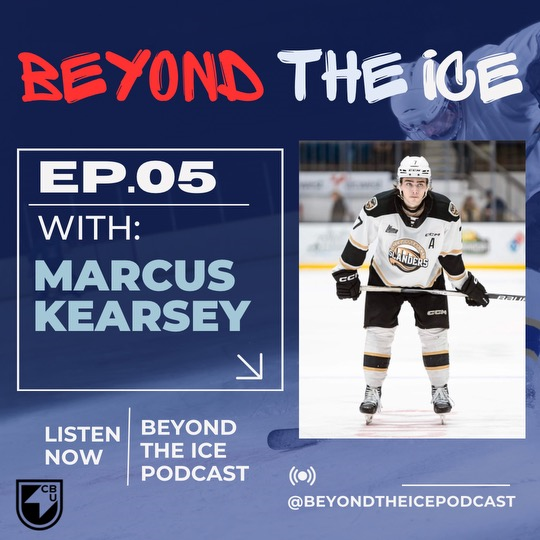
Born in 2006, Marcus was raised on the west coast of Newfoundland. Hockey has been a favorite sport and pastime for Marcus Kearsey most of his life. Playing in Deer Lake, Newfoundland for his minor hockey career, Marcus soon found the pathway to an exciting offer to play high school prep in Rothesay, St. New Brunswick. After his high school career finished, he prepared for the transition into the Quebec Maritime Junior Hockey League (QMJHL). Moving from New Brunswick to PEI after being drafted by the Charlottetown Islanders, Marcus enjoyed much success within his new island home. In 2024, after finishing his second season with the Charlottetown Islanders of the Quebec Maritime Junior Hockey League, he was the leading defenders in the league in assists on the power play while also being ranked in the top 10 for all defensemen. In his second season, he had 49 points in 68 games.
Marcus is just not a star on the ice. He’s also a leader in the locker room and his community. At the start of the season, Kearsey partnered with the Boys and Girls Club of Prince Edward Island to create the program, Kearsey’s Kids.
Kids, along with their families, were invited to every Islanders home game where they could meet with Marcus before the game. Giving back to the community has been an integral part of hockey leadership that we witness across many teams, both professional and locally. Marcus was instrumental in establishing his community program, which has been reported to provide many additional benefits including team improved functioning and overall well-being. As Cotterill et al., 2022 posit, leadership has demonstrated to be a fundamental factor influencing the performance of sport teams. Within these teams, leadership may be provided by coaches, formal athlete leaders, such as team captains, and other ‘informal’ athlete leaders. The role of the athlete leader in a team, has been consistently reported over the last 10 years to have a significant impact upon a teams’ functioning and effectiveness, as well as teammates’ general health and overall mental well-being.
As Marcus explains:
“Yeah, I mean, like you said, leadership was something that stemmed in my family from a young age and just from the people I surrounded myself with. I mean, leadership and having role models to look up to was a big part of my life and a big part of growing up for me. So once I found myself in a position to be able to do that and be that role model for younger kids, I jumped right on it.”
Using his position within the Charlottetown Islanders hockey club, Marcus engaged the team staff and players to share his idea about Kearsey’s Kids… and the rest is history. Loughhead et al., 2006) detail that athlete leadership has been defined more specifically as ‘an athlete, occupying a formal or informal role within a team, who influences a group of team members to achieve a common goal (p. 144). Athlete leaders have been reported to positively influence team cohesion, athlete satisfaction, team identification, team confidence and the motivational climate within the team (Cotterill and Fransen, 2016). Marcus explains:
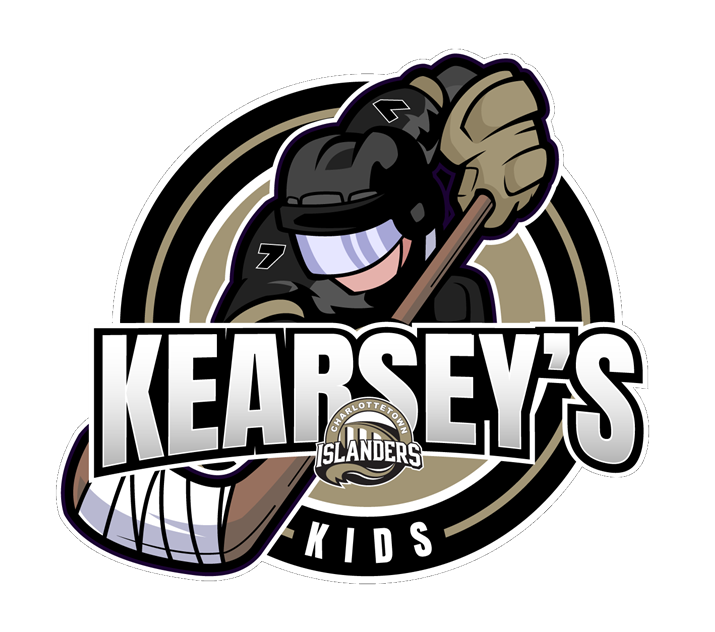
“I talked with some of the staff at with the Islanders and we’ve decided that we would take on the initiative to go on with the Boys and Girls Club. And I mean, ended up changing halfway through. But it’s, you know, the same concept with the kids and those programs to help those kids…we brought them to the game to our home games every night. And they got to go on the bench. And the biggest thing about it was just to put a smile on their face and just to make them happy…and I think that’s what we did, too.”

|
Mike Chiasson, Pittsburgh Penguins Goalie Development Coach
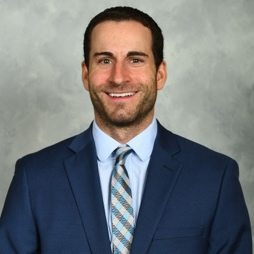
Mike is a former goalie from Coal Harbor, Nova Scotia, and he’s the current manager of Youth Program Hockey with the Pittsburgh Penguins and Goalie Development Professional at UPMC Lemieux Sports Complex. Most recently, Mike is now the Goalie Development Coach for the Pittsburgh Penguins. He is also a former Quebec Major Junior Hockey League Goaltender with the Rimouski Oceanic and finishes playing career with four years at Acadia University. Prior to joining the staff, Mike spent two seasons as an assistant coach with the Acadia Axemen and the technical director for the Acadia Minor Hockey Association.
Goal setting in hockey can be a daunting task for many coaches, and perhaps even more for goalie coaches. Mike brings a wealth of experience coaching at various levels which led him to the NHL team, Pittsburgh Penguins. Mike travels with the Pittsburgh Penguins NHL hockey team supporting goalie development and training for the club’s active goalies and prospects.
Mike explains that communication and relationship building between players and coaches is extremely important and valuable. Working with the goalies, usually represents 2-3 players from the team and creating connections is invaluable. He says:
“and whether they’re a goalie or a player or a goalie standpoint, there’s only a couple on a team… I think the biggest thing is finding a way to connect with that person and give them confidence. And I think it doesn’t have to be a technical coaching aspect….and whether you’re a goalie specific coach or a regular coach, I think it’s just being able to communicate with that athlete properly” (LeVatte et al., 2024).
Communication is one aspect in which researchers have documented as an indispensable asset for coaches (Kim and Park, 2020). Additionally, Sports psychologists who also work with elite levels athletes also unanimously agree that the coach–athlete relationship is a crucial predictor of successful coaching. Jowett & Lavallee (2007) explain that the coach–athlete relationship can be also defined as an interaction in which the cognition, feelings, actions and behavior of the coach and the athlete are mutually and causally interrelated and change over time.
Mike concluded that:
“I think often that gets overlooked where a coach can kind of talk to a group of 20 players and can almost not yell at them but be a little firmer with a group. And then if you try to take that approach with a goalie and if it’s an individual and you call out that individual athlete, it’s rarely going to be a positive impact on that goalie” (LeVatte et al., 2024).
Addressing communication barriers and using a focus approach for effective leadership within the realm of coaching is important to Mike. He shared the following example with us:
“at an intermission, for example, if you’re going to single out that goalie and kind of say he’s got to be better and come at them, I don’t think they’re going to respond well. When coaches say they don’t know how to respond to their goalie, I think it’s just talking to that person, and giving positive support (LeVatte et al., 2024).

|
Doug MacLean, Former GM and NHL Hockey Coach and Sportsnet Host
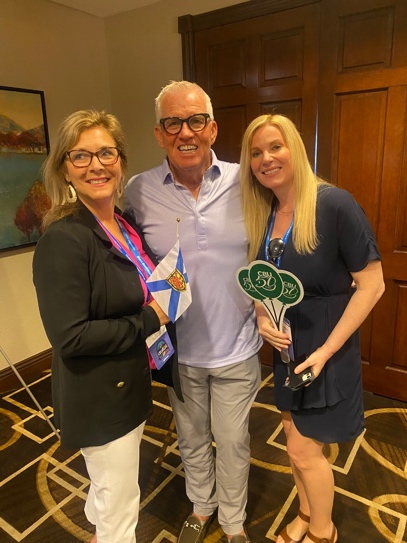
Before his 24-year career with the NHL, Doug had many maritime connections and played varsity hockey with the University of Prince Edward Island Panthers. With a Bachelor of Education degree and a master’s degree in educational psychology from the University of Western Ontario, Doug MacLean began coaching at the University of New Brunswick. He served in many management and coaching capacities, including assistant coach positions with the St. Louis Blues and the Washington Capitals.
Doug also coached for five years with the Detroit Red Wings. He was president and general manager of the Columbus Blue Jackets for 10 years. And prior to that, MacLean was head coach of the Florida Panthers. He is probably best known for leading the then upstart Florida Panthers team to the Eastern Conference Championship and playing in the Stanley Cup finals. Summarizing his lengthy career as an NHL club president, GM, assistant coach, and head coach. In addition, Doug is a beloved former Canadian sportscaster working in television and radio as a hockey analyst with Sportsnet Canada for nine years.
And recently in 2023, Doug became a best-selling author with his first book Draft Day and has consistently hit the best seller list.
When we interviewed Doug during the podcast, he spoke to his life as a young hockey player growing up in PEI and having many great stories with his family and billets. He shared his uplifting experiences through his career, which included both player, coach and general manager.
“Funny, I mean, I started playing in Summerside as a kid and I’ll never forget mom talking, she’s passed a couple of years ago, but saying they took me to skate when I was like five and she came home and said to dad, like, we don’t have to worry about him being in hockey. He’s terrible on skate….it started in Summerside and really the love of the game and playing minor hockey” (LeVatte, et al., 2024).
Doug was fortunate to play hockey through the Maritimes and eventually gain the attention of the Montreal Junior Canadiens as well as the St Louis Blues. His career guided him as a player, coach and general manager. We asked Doug about the lessons he learned from his career and asked about leadership. One example he shared was selecting the role of team captain and how he approached that decision.
As Doug explained:
“I guess, but I think the biggest thing from day one, getting involved in hockey and hockey schools and moving on to the professional ranks. I often thought about the first time I had to pick a captain, a leader of the dressing room…and I thought, what do I really want in the leader of my team? And the first thing that jumped into my mind was, I wanted somebody that cared, that was a caring person. He cared about his teammates. He cared about the organization. He cared about the city. He cared about the fans…you know, like just that type of person. That’s not easy to find. And it sort of stuck with me the whole way through from a leadership perspective that you got to really care about who you’re involved with, who you’re leading and who you’re working with” (LeVatte et al., 2024).

|
Chris Culligan
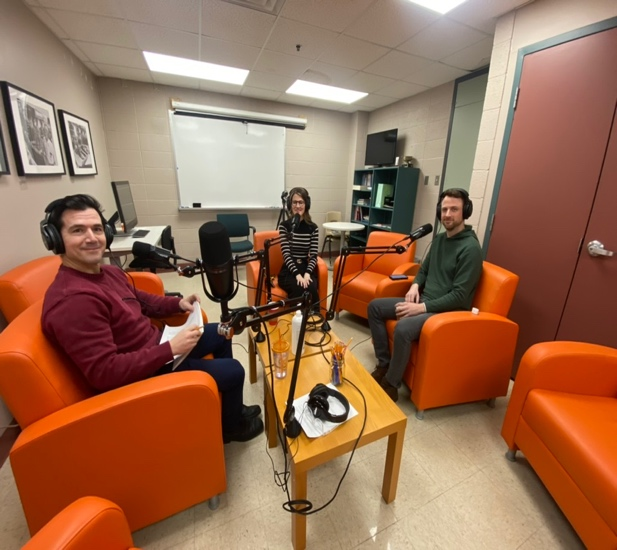
Born and raised in Howey Center, Chris Culligan has had a notable hockey career in Canada and abroad as both player and coach. From 2004 to 2009, Chris showcased his exceptional skills in front of a hometown crowd as a player and former captain with the then Cape Breton Screaming Eagles, leaving a memorable mark during his tenure. From there, Chris continued to make waves at the University of New Brunswick from 2009 to 2014, where he was a two-time national champion.
During these years, Chris also represented Canada on the International stage. Following his university career, Culligan ventured into the realm of professional hockey, spending three impactful years playing abroad. Recently, his commitment to the sport extended behind the bench as he moved into coaching.
Bringing his wealth of experience back to the Cape Breton Eagles, Chris served as an assistant coach for three years, imparting his knowledge and passion for the game to the next generation of players. Now, the head coach of the local UA team program, Chris continues to contribute to the development of young talent. In parallel, he established Culligan Hockey Development, a small group skill development business focusing on both in-season and off season.
Using his vast hockey experiences to leverage his coaching and playing, Chris highlighted how the sport really helped a quiet & shy child to learn about confidence and teamwork as he reflects:
“I think a big part of that was being a quiet, shy kid, introverted kid and I learned to express myself and learned socially how to deal with those situations through the game itself…this is something that once you’re done playing, I feel like you reflect more on that and where it started, why it started, stuff like that. And I think I’ve learned through that reflection that it probably started in my neighborhood, out in front of the house, just playing with friends” (LeVatte et al., 2024).
Chris also had a unique opportunity as he was drafted to play with the hometown Cape Breton Screaming Eagles of the Quebec Major Junior Hockey League. Chris described this experience:
“playing major junior at hometown was something incredibly special and getting a chance to play university. And it seems like finally have some success as a team and get that opportunity to experience what that looks like was very cool as well.” (LeVatte et al., 2024).
Hockey has provided Chris with several playing and coaching opportunities. Many options were available to Chris after his Junior career ended. He credits the importance of receiving his post-secondary education as a critical decision for him. As he explained:
“I still had aspirations to play pro. I felt UNB is a highly credible program for hockey especially…I felt at that point that I didn’t have like great enough offers pro wise to go and give up the five years of educational support that I accumulated through playing the major junior. And both my parents being teachers, that made it a little bit tougher to give up on that part too. I went there with aspirations to continue to play and still have a chance to play pro when I was done there, whenever that would be” (LeVatte et al., 2024).
Hockey life contributed to time at UNB as well as professional career playing time in Europe. Currently, Chris operates a local hockey business and coaches a team within the Nova Scotia U 18 AAA league.
 Listen to Beyond the Ice: Episode 3 Listen to Beyond the Ice: Episode 3 |
Charlie Bourgeois – Founder Atlantic Hockey Group
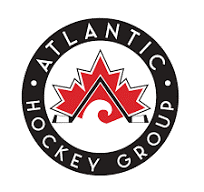 A native of Moncton, New Brunswick, Charlie Bourgeois brings over 12 years of professional hockey experience to the Atlantic Hockey Group. His amateur career was crowned by a Canadian University Championship with Les Aigles Bleus de l’Université de Moncton. Charlie was named an All-Canadian in that championship. During his NHL career, Charlie played for the Calgary Flames, the St Louis Blues and the Hartford Whalers. His professional career also included playing and coaching in Europe for three seasons.
A native of Moncton, New Brunswick, Charlie Bourgeois brings over 12 years of professional hockey experience to the Atlantic Hockey Group. His amateur career was crowned by a Canadian University Championship with Les Aigles Bleus de l’Université de Moncton. Charlie was named an All-Canadian in that championship. During his NHL career, Charlie played for the Calgary Flames, the St Louis Blues and the Hartford Whalers. His professional career also included playing and coaching in Europe for three seasons.
Founded in 1989, the Atlantic Hockey Group program has become one of the most successful in Atlantic Canada. The philosophy of the Atlantic Hockey Group is to bring together a group of highly qualified instructors in a professionally structured training environment. Atlantic Hockey Group works with over 10,000 young male and female hockey players each year, as well as having over 500 coaches involved in different programs.
Mentoring hockey coaches through personal growth and development has been established within various options through many hockey National organizations (Hockey Canada, 2025, & Landers, n.d.). This is also a priority for the AHG. Supporting minor hockey coaches, we often search for personal traits or characteristics that may be best suited for individuals who have a passion for hockey and want to share this through coaching. Our project worked closely with Charlie, Brandon and many senior staff to gather data specifically related to these ideals. We posed the question to Charlie, inquiring about developing individual character and leadership, transferring those life lessons and of course parenting. His response was enlightening:
“I was very fortunate to have wonderful coaches. Three of my NHL coaches won Stanley Cups. Unfortunately, I wasn’t on those teams when they won, but certainly that’s one of the challenges now that not only we have, but also minor hockey associations, which is basically a 100% volunteer system, so how do we mentor coaches?
How do we provide them those tools and resources? And that’s a continuous challenge for us as well as many other sports groups. The AHG supports coaching through online and in person coaching resources as well as subspecialty areas, such as goaltending. Dave Kennedy has worked as their lead goaltending coach for many years and often mentors new coaches. Charlie also reflected upon the critical role that parents and guardians play within the sport of ice hockey. He describes his family experiences:
“As a dad, my wife and I had four kids, two daughters, two sons, and they played every sport, and we want them to do well. But for us, it’s about teaching life skills through sports as parents. Respect, discipline, hard work, teamwork. Whenever I meet with parents, that’s what we try and stress.”
The primary focus of enjoying the sport, individual perspectives and player centered focus is something which Charlie and the AHG appreciates and promotes. He describes the need for players to play …parents to support that player journey and to enjoy the sport which can be extremely competitive. Comparing the likes of Crosby and MacKinnon, he notes that the elite calibre of players making professional hockey leagues such as NHL can be long journey in which only a few succeed within the elite levels. He explains:
“I like the word perspective, keep it in perspective. And I think also for parents, a reminder maybe of whose perspective we’re focusing in on here. The kids are playing the game and maybe regardless of that parent’s previous experience in the sport, to kind of keep it at that kid’s perspective or their player’s perspective. I think that’s an important reminder for all of us.”
 Listen to Beyond the Ice: Episode 1 Listen to Beyond the Ice: Episode 1 |
The Beyond the Ice Podcast Series
Access the full series of Beyond the Ice podcasts online.

